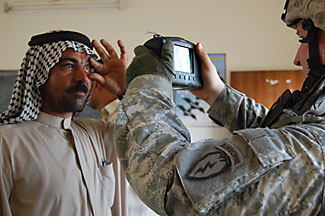James Janega with the Chicago Tribune follows up the reporting that I and Bill Ardolino have done on the campaign in and around Fallujah area of operations.
The last car bomb in Fallujah exploded in May.
On that warm evening, insurgents drove a vehicle packed with explosives into mourners for a slain local tribal leader as they wound through a ramshackle corner of the city, killing 20. The next day, Fallujah’s mayor banned all vehicles from city streets.
If there were no cars, reasoned Mayor Saad Awad Rashid, there could be no car bombs.
“It stopped,” said Lt. Col. William Mullen, commander of a shrinking force of U.S. Marines in the city who have watched the insurgency melt into the encircling countryside. “The ‘significant events’ in the city stopped. I think a lot of [the insurgents] left.”
The Americans are not far behind: After surrounding the city with walls and improving security on its streets, the Marines are pulling back from the one-time insurgent bastion of Fallujah. They are redeploying to surrounding areas as the U.S. troop “surge” allows them to consolidate progress made largely by tribal leaders and local officials in security and civil works.
They leave behind a city devastated by years of fighting and starved for reconstruction, as well as questions about whether Fallujah — a place infamous for the 2004 mob killings of four American contractors and two resulting U.S. offensives — can now serve as a model of stability for a wider American troop withdrawal from Iraq in the months and years to come.
It has been a workable but messy solution, with successes like the reduction in car bombings coming as much from the mayor’s spur-of-the-moment decisions as any military planning.
A partially trained Iraqi police force and bands of armed volunteers now work under American supervision, carefully preserving peace on streets covered by years of trash and rubble. To live under this new protection, most of Fallujah’s 250,000 residents submitted fingerprints and retina scans to get identification cards that let them stay in the city.
As a point of fact, Lt. Col. Mullen is now a Colonel, one of thirty two promoted to Colonel effective October 1, 2007, prior to the publication of the Tribune article. Also, there aren’t a quarter of a million residents left in Fallujah. The article does go to show that the Marines in the Fallujah area of operations are currently primarily engaged in reconstruction, rebuilding and public affairs. The article also reminds the reader that more work needs to be done.
It is a place under 24-hour lockdown, surrounded by berms and barbed wire. But that’s a price Fallujah’s war-weary residents say they are willing to pay for now.
“The last four months, things have been going better,” said Khamis Auda Najim, a 38-year-old cabinet-maker in Fallujah’s Andalus neighborhood. “But the changes are just on the security side. The street surfaces, the sewage, the electricity, the water? Those aren’t as good.”
U.S. forces promise those services are coming, along with U.S.-funded reconstruction projects and more money from the federal and provincial governments. But nothing in Fallujah moves quickly. As they face impatient city residents, the Americans are learning that everything is important now.
“I’ve been an infantry officer for 10 years. Since I’ve been here, I’ve learned more about water treatment and sewage than I’ve ever wanted to know,” said Marine Capt. Jeff Scott McCormack, 32, a company commander from Oak Forest, Ill.
Quick transitions have been made from the U.S. forces that established security to civilian Iraqi forces deployed to preserve it. The last Iraqi army troops left a month ago; the streets are now in the hands of 1,500 volunteers and police officers, some of whom have completed abbreviated training courses.
Heavy kinetic operations in May and June of 2007 were followed on by gated communities and biometrics, and involvement of the local Iraqi police along with paid individuals engaged in community watch. Marines filled sand bags and constructed joint combat outposts – Police Precincts, and patrolled with Iraqi Police in order to give them confidence. With the comparative irrelevance of tribal leaders in the Fallujah area, Muktars were engaged to provide leadership of and communication with the communities.
Upon pacification of Hit, Haditha, and Ramadi (all by different means, Haditha with sand berms, curfew and a ban on vehicular traffic, Ramadi with tribal engagement), the insurgency fled to Fallujah, where kinetic operations routed them from the area in the second quarter of 2007. Many of them left and went home to Lt. Col. Bohm’s area of operation, where they are being carefully assimilated back into society.
Col. Richard Simcock who commands Regimental Combat Team 6 is measured and careful, yet honest with where he believes Anbar currently stands.
U.S. Marine Colonel Richard Simcock, who commands the 6th Marine Regiment, says his forces have successfully routed the insurgents in Anbar province.
“There are still attacks in Fallujah and surrounding areas,” said Colonel Simcock. “We have not killed or captured every single al-Qaida member that is here. But their capabilities are greatly diminished. I would characterize them as a defeated force from my perspective.”
Speaking to reporters in Washington via satellite from Iraq, Colonel Simcock says the surge of more U.S. forces in Anbar and Baghdad has allowed Marines to stay in areas where al-Qaida in Iraq terrorists have fled to prevent insurgents from returning.
He also credits the cooperation of the Iraqi army and police, as well as local tribal leaders in the effort to defeat al-Qaida in Iraq and bring security to Anbar.
“That has been the building block that has allowed the people to come out and participate in governance,” he said. “But, probably more importantly, it allows them to come out and do the things that a lot of the citizens here in al-Anbar have not been able to do because of murder and intimidation that al-Qaida was doing. We have made great strides in regards to that, and we are very, very pleased with the progress that we are making.”
Measured, careful and honest. There are still attacks – we have not killed or captured every single AQI member – but they are a defeated force. Exporting this model is complicated and nuanced, and involves more than just the participation and approval of tribal shiekhs, no matter what the current narrative says. Nibras Kazimi has crafted a smart analysis of tribes and their saliency in Iraq for the New York Sun.
Does it really matter, whether tribes were the primary factor in defeating Al Qaeda or not, given that the story coming out of Iraq is more and more hopeful? Yes it does: the implication is that if you don’t know why and how you’ve won, then you won’t be able to replicate victory. The tribes, like the American troop surge, were catalysts that sped up the demise of the insurgency, but they did not trigger the process the insurgency’s failure predated the surge and any tribal strategies.
I believe the insurgency failed because it had bad ideas and unrealistic expectations. When the price paid by the local population for these ideas and expectations — fighting the Shiites and re-establishing Sunni hegemony — became too steep, Sunnis turned against the insurgents and tried to find shelter, yet again, under the central government This latter trend is the one that should be reinforced: Sunnis should be encouraged to throw in their lot with the New Iraq, rather than falling back into the tribal identities of Iraq’s past.
Once tribal leaders realized that Al Qaeda was losing, they turned towards Baghdad for guidance. As one Iraq observer put it to me, “Tribes are a barometer of power; they swarm around whoever has the upper hand.” The danger now is that Americans are trying to resuscitate a clannish social system that had withered away in Iraq, and turning it into a power in of itself.
We agree with Kazimi. Nonetheless, the U.S. has worked with tribes where it suited our needs, and community Muktars where it suited our needs. Given the constricted time frame that the U.S. public will allow for this counterinsurgency campaign, efficacy and expediency is the order of the day. Thus, following the model in Fallujah, do we see retinal scans being taken by Army troopers south of Baghdad.

The Christian Science Monitor has an article in which they examine the export of the Anbar model to Shi’ite parts of Iraq.
Forward Operating Base Iskan, Iraq – The violence has dropped dramatically, say US commanders, in the towns surrounding this base in northern Babil Province, south of Baghdad.
In May, four improvised explosive device (IED) attacks targeted the battalion; none in August, says Maj. Craig Whiteside, executive officer of the 1st Battalion of the 501st Infantry Regiment. Fewer undetonated IEDs have been found – five in May and two in August. Indirect fire and small-arms violence have also dropped from about a dozen incidents in May to less than three in August.
The reason, they say, is that the same approach that won success in Anbar Province, where the Marines gained support of Sunni tribesmen against Al Qaeda, is taking hold in mixed-sectarian areas. But here, Americans have enlisted Shiites frustrated with extremists from such groups as the Mahdi Army, run by Moqtada al-Sadr.
Across the Euphrates River Valley, known to the military as the southern belts of Baghdad, about 14,000 Shiite and Sunni “concerned citizens” are being paid to man checkpoints and patrol roads in an effort to prevent attacks from violent extremism of either sect.
Largely untrained and armed with weapons they already own, the citizens wear armbands and monitor traffic along the roads, keeping watch to ensure no outsiders or other extremist elements come through to bury roadside bombs. If they fail to keep violence out, they could lose their monthly paycheck. Ultimately, the idea is that they will become members of the Iraq security forces.
“They are making their community safe,” says Army Capt. Charles Levine, one of the company commanders here. His battalion has recruited more than 1,300 participants since mid-September. A little less than half of them are Shiite.
Concerned citizens and turnover to the local communities is the key to the current counterinsurgency strategy in Iraq. If the hope is that people are taking responsibility for reasons other than their tribal Shiekh says to do so, this strategy is seeing some success.
A 72-year-old man stopped a suspected suicide bomber from detonating himself at a checkpoint in Arab Jabour Oct. 14.
The man approached a checkpoint where Mudhehr Fayadh Baresh was standing guard, but did not make it very far.
Baresh, a tribal commissioner and member of the Arab Jabour Concerned Citizens program, said he ordered the man to lift his shirt – using training received from Coalition Forces – when he did not recognize him as a local villager.
The suspect refused to lift his shirt. Baresh repeated the command again, and the suspect exposed his suicide vest, running toward the checkpoint.
Baresh opened fire which caused the vest to detonate, killing the suspect.
“I did it for the honor of my family and the honor of my country,





